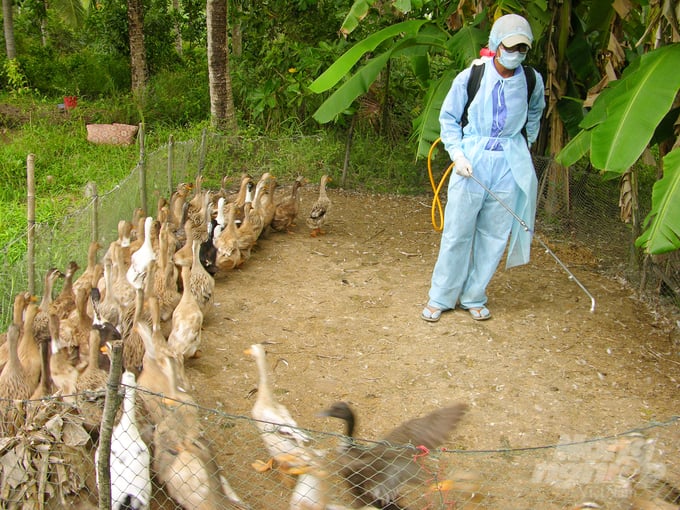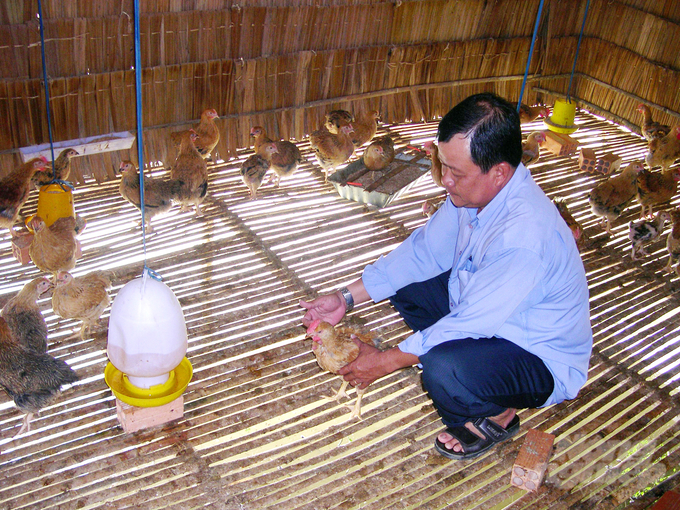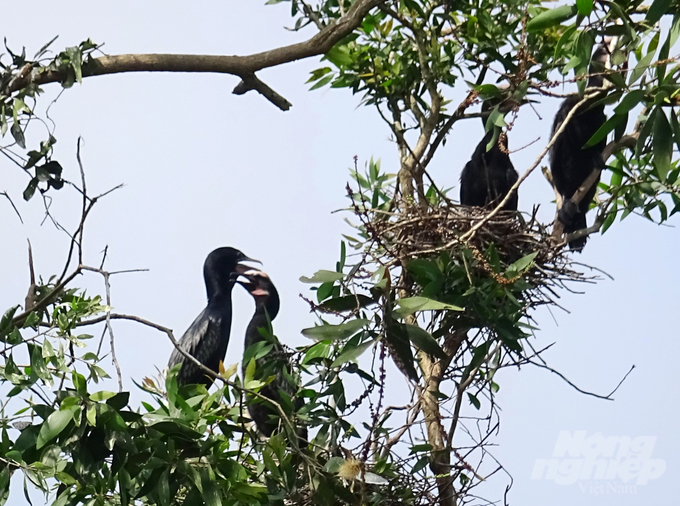June 16, 2025 | 12:47 GMT +7
June 16, 2025 | 12:47 GMT +7
Hotline: 0913.378.918
June 16, 2025 | 12:47 GMT +7
Hotline: 0913.378.918

Veterinary staff in communes and towns in Tam Nong district sprayed disinfectants to cleanse the environment and distributed Benkocid to livestock farmers so they could spray on their own barns. Photo: Le Hoang Vu.
Tam Nong district (Dong Thap province) is located in the Dong Thap Muoi region and is close to the Cambodian border. There are frequent outbreaks of diseases in livestock and poultry such as foot-and-mouth disease, septicemia, blue ear disease, and avian influenza. The potential risk of outbreaks and recurrences of diseases in the district is deemed very high, but in recent years, Tam Nong has not let diseases occur and has instead always protected livestock and poultry, contributing to stable development.
Tam Nong district is currently raising 11,599 livestock, including 2,165 cows, 345 buffaloes, 7,583 pigs, over 1,500 goats, rabbits and civets of various kinds. Farmers in the district also raise 685,771 poultry of various kinds, including 555,215 ducks and 57,972 chickens. The whole district has 88 houses raising swiftlets, totaling 72,490 heads.
Since the beginning of the year, Tam Nong district has not had any outbreaks of disease in livestock thanks to the harmonious coordination between the district's Department of Agriculture and Rural Development, Agricultural Service Center and local authorities. Veterinary staff regularly go to each commune to inspect the disease situation and closely urge proactive actions, so vaccination of livestock and poultry always achieves a fairly high rate.

Tam Nong has few outbreaks of livestock diseases thanks to veterinary staff regularly going to each commune to inspect the disease situation and actively urging vaccination of livestock and poultry. Photo: Le Hoang Vu.
“Since the beginning of 2024, the disease situation in livestock, poultry and aquatic products has been relatively stable, thanks to proactive and full-scale vaccination,” said Lam Trong Nghia, Deputy Director of Tam Nong District Agricultural Service Center. The District Agricultural Service Center has coordinated smoothly with communes and towns in the district to organize vaccination of nearly 200,000 doses of vaccine to prevent disease in poultry flocks. Going one step further, it recommends farmers to strictly follow the "5 no's": no raising free-range poultry, no conducting trades using sick poultry, no eating sick poultry or poultry of unknown origin, no hiding epidemics, and no littering poultry carcasses.
One thing to note is that Tram Chim tourist area, Tram Chim National Park and other eco-tourism spots in Tam Nong district have not been affected by avian influenza. These places have been proactive in preventing, stopping and suppressing the epidemic for many years.
In particular, the Board of Directors of Tram Chim National Park has proposed practical measures to prevent avian influenza from entering Tram Chim National Park, causing harm to birds, storks and other rare animals, especially at the time of the Scheme to conserve and develop red-crowned cranes in Tram Chim National Park.
“To limit the spread of the disease to birds and storks in the park, some urgent measures are needed. We mobilize people living around the park to proactively vaccinate their poultry and move the poultry away from the park, or destroy poultry showing signs of influenza. We also strengthen education for people in communes and towns in the buffer zone living near Tram Chim National Park to always raise awareness of disease prevention and control,” said Doan Van Nhanh, Deputy Director of the Center for Conservation and International Cooperation, Tram Chim National Park.

Tram Chim National Park has proposed practical measures to prevent avian influenza from entering the park and harming flocks of birds, storks and other rare animals. Photo: Le Hoang Vu.
Although there have been proactive measures to deal with the avian influenza pandemic invading Tram Chim National Park, the Park Management Board is still concerned about the objective difficulties it is facing.
“The first difficulty is that because of the large area, there are 231 species of birds and storks living here, and 32 of them are considered rare species. These birds often migrate and live here for a long time. The park's management board is also concerned that some birds from other regions will bring diseases, causing difficulties in managing and preventing diseases,” the Deputy Director said.
Tram Chim National Park’s number one requirement is that all levels, sectors, together with the park, including officials and people, raise awareness and stay vigilance while working together on the prevention of avian influenza. Only then can the rare animals in Tram Chim National Park be preserved and safe from disease.
Translated by Samuel Pham

(VAN) The working delegation from the Ministry of Agriculture and Environment conducted an important trip to the Netherlands to strengthen strategic partnerships and sustainable development in the agricultural sector.

(VAN) The letter ‘A Plea from the Ocean’ not only evokes emotion but also awakens the human conscience to the responsibility of protecting life on Earth.

(VAN) The Department of Agriculture in South Africa has announced the country’s first mass vaccination of poultry to prevent local birds from contracting avian influenza.

(VAN) Establishment of the Mekong Delta Regional Agricultural Linkage Center, aiming for a closed value chain, deep processing, trading platforms, and international market connectivity.

(VAN) Gia Lai province has recently recorded 460 rare species of animals and plants, contributing to forest conservation and biodiversity planning in the region.

(VAN) Ms. Caroline Beresford, New Zealand Ambassador to Vietnam, expressed confidence that agricultural cooperation between Vietnam and New Zealand will develop sustainably, be climate-resilient, and promote gender equality.

(VAN) Vietnam reaffirms its commitment to international cooperation in fostering sustainable and responsible fisheries while ensuring resilient livelihoods for small-scale fishing communities.